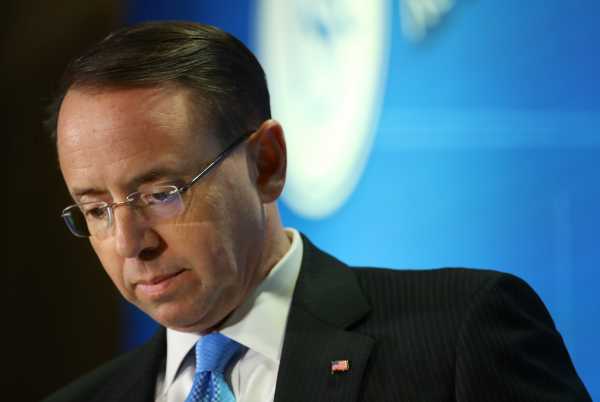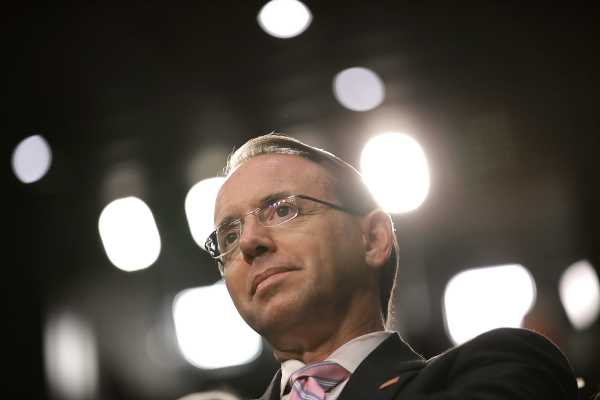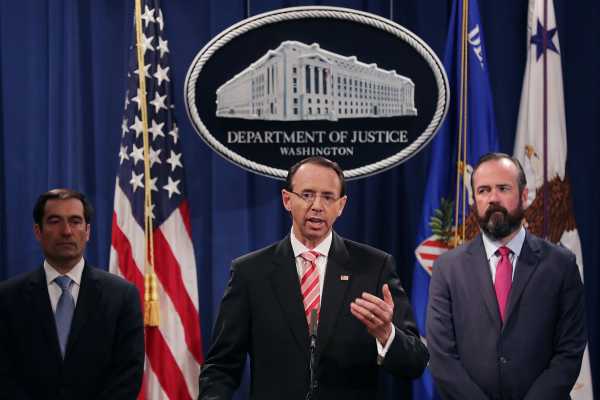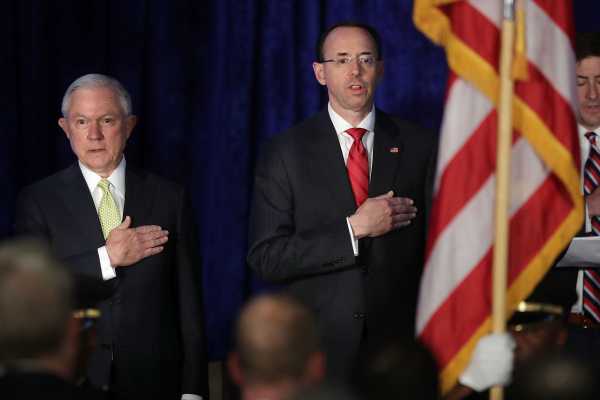
Deputy Attorney General Rod Rosenstein, who appointed Robert Mueller as special counsel to oversee the Russia investigation, plans to step down from his post in the coming weeks, according to new reports from ABC News and NBC News.
Both reports stress that Rosenstein’s decision to leave the administration is voluntary, and that he plans to wait to do so until a new attorney general is confirmed. Trump’s AG nominee, Bill Barr, will face his Senate confirmation hearings next week.
However, a second report from NBC News published Wednesday afternoon slightly differs, citing a source close to Rosenstein saying he “intends to stay on” until special counsel Robert Mueller submits his final report on the Russia investigation, which is expected soon. After that, the source claims, he’ll step down.
As deputy attorney general, Rosenstein was responsible for the day-to-day running of the Justice Department. But the main reason he’s become so well-known is because he appointed Mueller and spent nearly 18 months as the ultimate supervisor of Mueller’s probe (because Attorney General Jeff Sessions was recused).
Through all this time, Trump complained about Justice Department investigations into him and his associates, and repeatedly mused about firing top Justice Department officials and replacing them with loyalists. And in November, he finally did it, firing Sessions and appointing Matthew Whitaker as his acting replacement — meaning that Whitaker, not Rosenstein, became Mueller’s top overseer. But Rosenstein has reportedly continued to remain involved in the investigation in his role as Whitaker’s deputy.
Barr’s nomination appeared to raise serious questions about the Mueller investigation’s future. Back in May (months before Trump nominated him), Barr wrote a 19-page memo harshly criticizing Mueller’s investigation, particularly with regards to the special counsel’s reported focus on obstruction of justice and efforts to subpoena or question the president.
Yet Rosenstein seemed undisturbed. Publicly, he has praised Barr as an excellent choice. And when asked about Barr’s memo last month, Rosenstein said, “Our decisions are informed by our knowledge of the actual facts of the case, which Mr. Barr didn’t have.”
We continue to have very little idea of what’s going on in the Mueller investigation behind the scenes — for instance, what the probe has found related to the president, and how close Mueller is to finishing up. But NBC News’s sources have claimed a conclusion is likely by “mid-to-late February” — while also admitting “that timeline could change based on unforeseen investigative developments.”
Who is Rod Rosenstein?

Rosenstein joined the Justice Department all the way back in 1990 and has been there ever since, serving as a public corruptions prosecutor and then taking on management jobs under presidents of both parties. In 2005, President George W. Bush appointed him to be US attorney for the state of Maryland, and he held that position throughout the Obama presidency as well.
After Trump won the presidency, he picked Jeff Sessions to be his attorney general. As a US senator, Sessions was an outsider to the DOJ. So he wanted someone who knew the department well in the deputy post (which is traditionally responsible for running things day to day). So he chose Rosenstein, who was respected by legal professionals in both parties.
The pick got little attention at the time but proved to be supremely important. In March 2017, Sessions announced he would recuse himself from the Russia investigation — meaning that as soon as Rosenstein was confirmed by the Senate, he’d be the top Justice Department official in charge of it.
Then, once Rosenstein was finally sworn in in late April, Trump waited only two weeks before inviting him and Sessions to the White House to discuss firing then-FBI Director James Comey. On May 8, 2017, Rosenstein wrote a memo harshly criticizing Comey’s handling of Hillary Clinton email investigation and gave it to the White House. The very next day, Trump fired Comey and released Rosenstein’s memo as his justification.
Rosenstein appointed Robert Mueller and oversaw his investigation for about 18 months

Comey’s firing was a shocking breach of political and institutional norms (the FBI director traditionally stays on for a 10-year term), and it threw the US political system into crisis. The ensuing chaotic days were filled with leaks claiming that Trump had privately pressured Comey for “loyalty,” that he’d urged Comey to drop an investigation into Michael Flynn, and that he’d disclosed classified information to Russian officials in the Oval Office. With such allegations of Trump apparently trying to corrupt the rule of law, even some Republicans began to talk about impeachment.
It was Rosenstein who made the key choice that abated this crisis — appointing Robert Mueller as special counsel to oversee the Russia probe on May 17, 2017. The appointment of a special counsel restored confidence that the rule of law would be preserved, and that if there was anything to the Russia scandal, he’d get to the bottom of it. Mueller in particular had sterling credentials as a former FBI director appointed by George W. Bush, which likely made him feel empowered to investigate quite vigorously.
Since then, there’s been an endless amount of ink spilled about the “Mueller investigation.” Yet for a year and a half, Mueller had one boss: Rod Rosenstein. And Rosenstein’s backing of Mueller was clearly crucial in shaping the probe so far:
- Mueller’s team has said in court that they inform Rosenstein of all their major decisions in advance, and that he would have the authority to overrule them.
- Rosenstein approved Mueller’s assembly of an all-star team that at its height totaled 17 prosecutors.
- In August 2017, Rosenstein wrote a memo to Mueller listing many people and topics he was authorized to investigate (the publicly released version is heavily redacted).
- Rosenstein held press conferences announcing Mueller’s two major indictments of Russians for election interference — the social media propaganda indictment in February and the email hacking indictment in July.
- He was also reportedly involved in Mueller’s decision to refer an investigation into Michael Cohen to federal prosecutors in Manhattan, resulting in Cohen’s guilty plea to tax, bank fraud, and campaign finance charges in August.
Finally, Rosenstein has also helped preemptively protect Mueller from firing. He did so by testifying that the regulation under which he appointed Mueller gives only him — not the president — the authority to fire Mueller. He has also said that he believes the regulation only permits Mueller’s firing for “good cause.” With that testimony, it’s clear that a Trump order to fire Mueller would be legally dubious.
Trump has long wanted Rosenstein out — but he moved against Sessions instead

The president has raged about the Russia probe and his Justice Department for well over a year now, both privately and publicly, with Sessions and Rosenstein frequent targets of his ire. (He’s reportedly dubbed them “Mr. Magoo” and “Mr. Peepers.”)
Trump has repeatedly complained that the Russia investigation is a “witch hunt,” that “flipping” witnesses (like Michael Flynn and Rick Gates) almost ought to be illegal, and that the Justice Department isn’t doing enough to investigate Democrats like Hillary Clinton and isn’t loyal enough to him personally.
Trump’s staunchest allies in Congress and in conservative media have joined him in this effort too, training criticism on Sessions and Rosenstein. Hardline House conservatives even threatened to force a vote on Rosenstein’s impeachment this summer, based on the thinnest of pretexts (though they eventually backed down).
The obvious fear many had was that if Trump ousts Sessions or Rosenstein, he could at least temporarily install a crony who would take over the Russia probe — one who could manage to rein it in or even shut it down entirely, to protect the president.
In September, it seemed that this opportunity had finally arrived because of a report published by the New York Times’s Adam Goldman and Michael Schmidt. The report describes purported conduct by Rosenstein in mid-May 2017 and Rosenstein’s decision to appoint Mueller. The Times claimed that in meetings with top FBI and Justice Department officials, Rosenstein made two eyebrow-raising suggestions: first, that they try to secretly record the president, and second, that they use the 25th Amendment to remove Trump from office. (Neither was carried out.)
But after much public drama and erroneous reports that Rosenstein was a goner, he held on — perhaps because Trump didn’t want to cause a new controversy shortly before the midterm elections. Instead, the president made his move the day after the midterms, when he fired Sessions.
Ordinarily, Sessions’s departure would mean Rosenstein would become acting AG to replace him. But Trump used an obscure law to bypass the Justice Department’s line of succession and install Matt Whitaker in the post. Whitaker was Sessions’s chief of staff, but the White House viewed him as loyal because of his past public criticisms of Mueller.
What’s happened since has remained mysterious. Whitaker announced he would not recuse himself from overseeing the Mueller probe. But from what we can tell, the Mueller probe appears to be continuing — with the latest major development being a plea deal with longtime Trump lawyer Michael Cohen, announced in November. There could be behind-the-scenes drama that we don’t know about. But Rosenstein does not appear to have been entirely removed from involvement in the investigation since, after all, he is still the deputy attorney general.
Rosenstein has reportedly said he’ll stick around DOJ until Barr gets confirmed, so the next big question is what Barr’s confirmation as attorney general would mean — and whether it will happen. Hearings before the Senate Judiciary Committee kick off on Tuesday, and he’ll surely be grilled about the memo he wrote last year criticizing Mueller and questioned about whether he’d let the investigation continue.
Updated to include information from a new NBC news report.
Sourse: breakingnews.ie
0.00 (0%) 0 votes


































